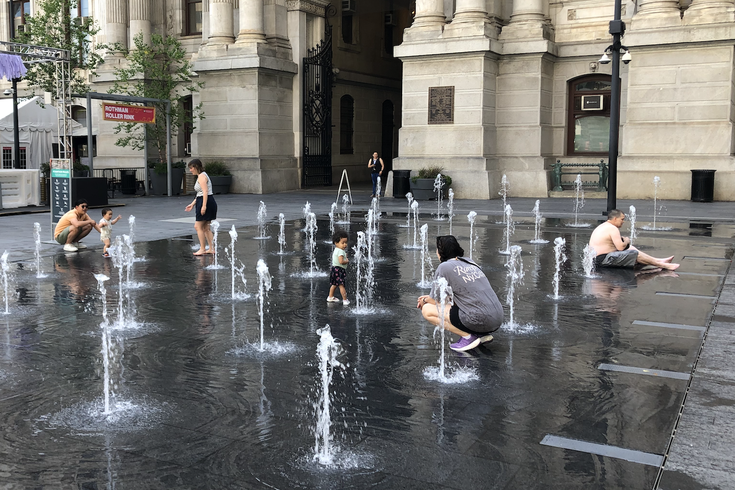
June 20, 2024
 John Kopp/PhillyVoice
John Kopp/PhillyVoice
A heat health emergency is in effect until Saturday, although it may extend if conditions worsen. Utility shutoffs are suspended and cooling centers are open. Above, children play in the fountains at Dilworth Park on Thursday morning.
Philadelphia's first heat health emergency of the year took effect Thursday at 8 a.m. and will end at midnight Sunday.
Several heat-related protocols will be in effect during the emergency. There are 153 cooling centers and sites open to the public. They include Free Library locations, recreation centers, senior centers, schools, spraygrounds and swimming pools. The library has extended its hours.
The Philadelphia Water Department has suspended utility shutoffs, and the Office of Homeless Services has declared a Code Red, which involves "enhanced daytime outreach" for unhoused people.
Philadelphia's Animal Care & Control Team is enforcing additional pet safety measures. Dogs must have at least one area of shade to accommodate their entire bodies. Violators of the ACCT Philly policy are subject to fines of $500 or higher.
Going into the weekend, the heat and humidity continue to build. The highest heat index values of this stretch look to occur on Sunday. Scattered showers and thunderstorms possible Saturday afternoon and evening. pic.twitter.com/M11HA026yF
— NWS Mount Holly (@NWS_MountHolly) June 20, 2024
The Department of Public Health declares a heat health emergency when the heat index is expected to fall within a certain range for at least two straight days. The heat index is a way of measuring how hot people feel when accounting for humidity and air temperature.
From May 1 to June 30, Philly an emergency is declared if the heat index reaches 101 to 105 on two consecutive days, or if it hits 98 to 102 for at least three straight days. From July 1 to Sept. 30, an emergency is declared if there are two straight days above 106 or at least three consecutive days above 103.
The National Weather Service declared a heat advisory until 6 a.m. Saturday for the Philadelphia region and an excessive heat watch from Saturday morning to Sunday evening. The heat index may reach 99 during the heat advisory and may get as high as 106 during the excessive heat watch.
Signs of heat stress include decreased energy, a slight loss of appetite, faintness, lightheadedness and nausea.
Older adults are most at risk from heat-related health conditions. Also at higher risk: children, pregnant women, people without air conditioning, people with chronic medical conditions, people who work in high-heat environments, people who take medications that affect body temperature, people engaged in strenuous physical activity, and alcohol and drug users.
Anyone concerned with questions about heat-related illnesses can call the Philadelphia Corporation for Aging's heatline at (215) 765-9040 to speak to a nurse.
People at risk of heat-related illnesses are advised to use air conditioners or fans, or visit a location with air conditioning. Everyone should drink plenty of water to avoid dehydration, and avoid alcohol and caffeine. Children, older people and pets should not be left alone in cars.
Wear lightweight and light-colored clothing, and remove any excessive clothing. Cover exposed skin with SPF sunscreen and consider wearing a wide-brimmed hat to protect the face and head.
Be sure to maintain a normal diet and consult a doctor if you regularly take medications, because the heat can cause some medications to have an adverse effect. Avoid outdoor activities if possible, especially during the sun's peak hours of 11 a.m. to 4 p.m., and shower or bathe in water that is close to skin temperature.